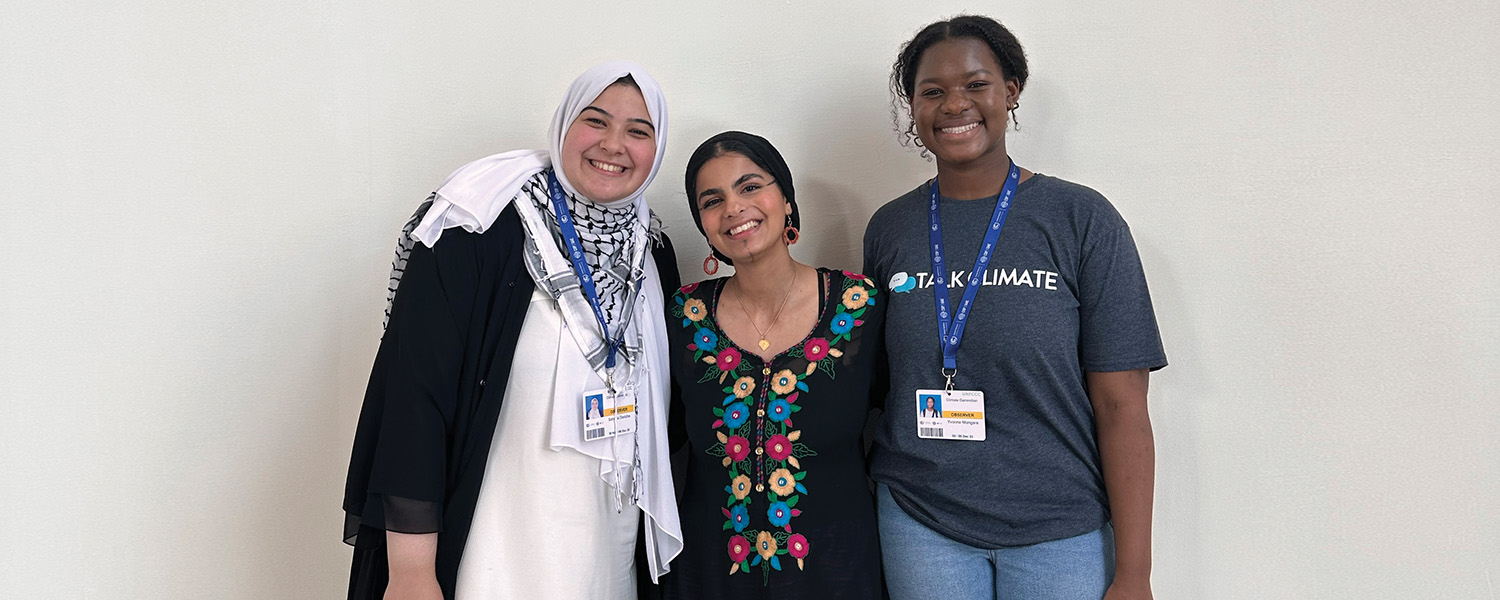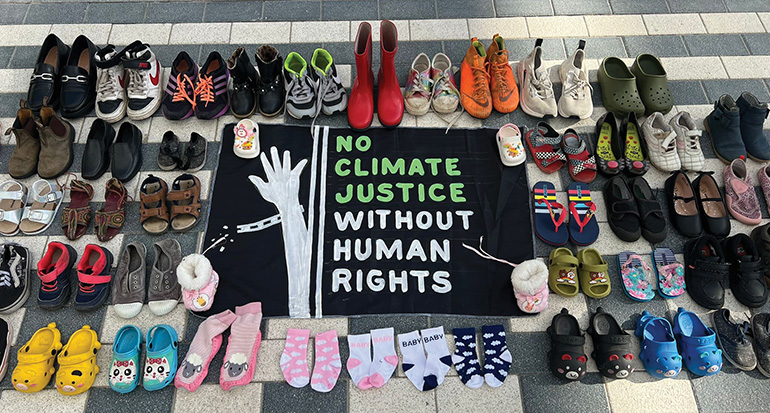When climate activism is inseparable from health care calling
BSN student Yvonne Mongare attended COP 28 in Dubai
May 13, 2024
Susan Maas

From left, Stanford University student Sabrina Deriche, Palestinian American climate justice activist Ayisha Siddiqa and BSN student Yvonne Mongare at COP 28 in Dubai.
When Yvonne Mongare, who grew up in Apple Valley, Minnesota, started living on campus at the University of Minnesota, she noticed that she’d developed a chronic cough.
“I was experiencing a lot of respiratory issues and congestion,” the second-year Bachelor of Science in Nursing student says. “My friends would bring me tea packets, and my dad bought me a humidifier.” Increasingly frequent wildfire smoke from Canada and the western U.S. in recent years — due largely to climate change — probably is a factor, Mongare believes.
Combine that with air pollution from other sources, which disproportionately impacts low-income neighborhoods with predominantly residents of color, and Mongare worries about a widespread increase in lung and heart problems. That’s one of the concerns Mongare brought with her to COP 28, the 2023 United Nations Framework Convention on Climate Change she attended in Dubai, United Arab Emirates, this past winter.
Mongare, who first got involved in the group Climate Generation’s Youth Environmental Action network in high school, doesn’t see climate activism as a side endeavor: it’s inseparable from her calling to health care, she says. Having worked part time for over a year as a certified nursing assistant at a nursing home, Mongare has more exposure to health impacts of environmental injustice. “There are so many patients who have type II diabetes, respiratory diseases. I can clearly see how the environment is affecting people’s health and preexisting chronic conditions,” she says.
The proud daughter of two nurses, Mongare decided to earn a nursing degree on her way to medical school. “I want to use my nursing degree as experience so I can have a guaranteed job postgraduation while I continue taking my medical school prerequisite courses,” she explains. Her passion for environmental justice is why Mongare was chosen as a Climate Generation delegate to the conference, which she attended with a dozen other University of Minnesota representatives.

Mongare, whose role was that of an observer, was the only University undergraduate at COP 28. Watching and listening, rather than actively helping set policy, was a challenge for Mongare. She testified last year at the Minnesota legislature, both in support of a climate justice education bill (that didn’t pass in that session) and the 100% clean electricity bill that did pass — “which was amazing,” she says.
“As a youth voice, and as a Black woman from Minnesota, I really want to make my voice heard,” Mongare says. She absorbed as much as she could, “going to many panels and workshops throughout each day. I was surprised to learn that until last year COP had never really had a climate-and-health day! I was happy to see that more people are becoming aware of how the climate crisis really intersects with health.”
One thing she learned at COP is just how paltry the U.S. contribution is to “loss and damage” funding for countries most vulnerable to climate change. “Honestly, $17.5 million is very, very small,” she says. As one of the world’s biggest contributors to greenhouse gas emissions, the country needs to do better, Mongare believes. “It’s important to have awareness of your agency as a global citizen, and what your country is doing in the world.”
Highlights of Mongare’s seven days in Dubai included meeting Hillary Rodham Clinton and Palestinian American climate justice activist Ayisha Siddiqa, a cofounder of Fossil Free University and climate adviser to the U.N. Secretary General. “It was definitely a privilege,” she says. The next U.N. climate conference is being hosted by another fossil-fuel hotbed, Azerbaijan, in November. Mongare would like to attend COP29 if she’s invited.
Mongare is grateful to professors Erin Armstrong, DNP, RN, CNE, and Linnea Benike, DNP, RN, PCCN, CNE, Dean Connie White Delaney, PhD, RN, FAAN, FACMI, FNAP, and Director of Planetary Health Teddie Potter, PhD, RN, FAAN, FNAP, for enthusiastically supporting her attendance at COP despite a heavy courseload. “I’ve thought a lot about how lucky I am to be in the School of Nursing. We actually have a community,” Mongare says. “All of my mentors are so passionate about advocating for our patients, advocating for patients experiencing health disparities. I’m very lucky to be in a school that’s conscious.”


